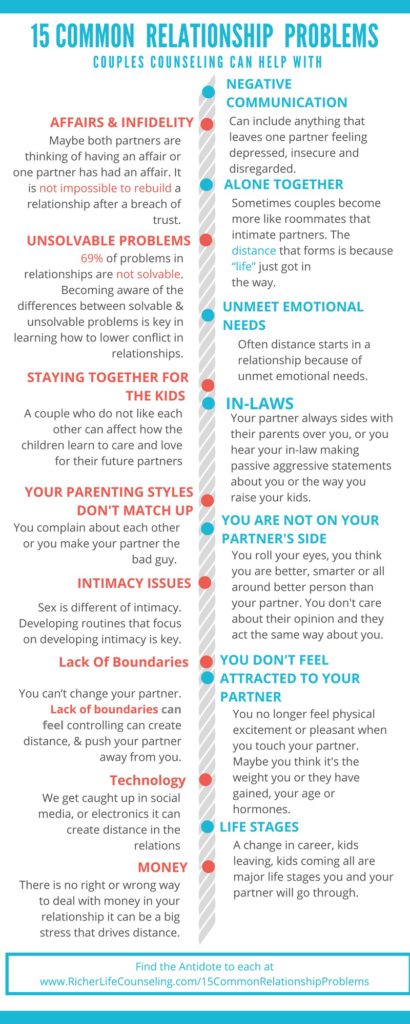Seeking out relationship therapy can be scary and feel like your relationship is doomed. When I work with couples in couples counseling, I notice trends that I see in my own marriage, and in almost all the couples I work with. Common relationship problems seem to be in all relationship. While each couple is different, the root of the difficulties falls into one of these 15 common relationship problems (in no specific order at all). I hope to share what some of the common relationship problems are and how couples counseling can help.
15 Common Relationship Problems
1 – Negative Communication
It’s hard to get back positive communication once it seems to have disappeared from your relationship. Negative communication can include anything that leaves one partner feeling depressed, insecure and disregarded. Negative communication is more than just talking. It can be heard in the tone of voice seen in nonverbal ways such as not making eye contact or looking at the cell phone while listening. Learn how I work with couples with poor
Dr. John Gottman has studied communication in relationships and has discovered 4 deadly ways to communicate. Dr. Gottman calls these four ways to communicate the Four Horseman of the Relationship Apocalypse. You can also check out Dr. Gottman’s book The Seven Principles For Making Marriage Work where he reviews these four horsemen and how to overcome them.
Antidote
- Make a ritual as a couple. Have coffee every morning, or tea every night after the kids are in bed. Take 10 to 15 minutes for each partner to check-in with each other and talk about their day. This is not about times to go over tomorrow’s scheduled, but times to just connect and share thoughts, and feelings.
- Scheduled family meetings. This can be with the kids and adults. This is where you have time to talk about the weekly schedule, budget, chores, etc. Setting time aside to speak specifically about life events puts everyone on the same page.
- Create rules for fighting. You know your partner better than anyone. What are off limits during a fight, what do you need from each other? A therapist will help you develop rules for you each to follow during an argument.
2 – Affairs and Infidelity

Maybe both partners are thinking of having an affair, or one partner has had an affair. It is not impossible to rebuild a relationship after a breach of trust. However, it does take a lot of work. Both partners must be committed to coming to therapy, and being open and honest inside and outside of the therapy office.
In couples counseling for affairs & infidelity, I use the latest reaches from emotionally focused therapy and the Gottman approach. These have some to get to the bottom of why the affair happened, and how to change the relationships, so it never happened again. I help work with my clients to understand the emotional needs that have, so their emotional needs can be healed and true repairing can take place. If you have discovered an affair seek out a therapist who uses emotionally focused therapy. If you are not ready to start therapy check out this book After the Affair.
Antidote
- Be consistent trust is built by doing the same thing for a long time
- Don’t lie
- Be fair If the hurt partner needs space
let them have it if they want closenessbe there for them. Learning to be emotionally present is the best way to heal - Ask your partner what needs do they need to be met
- Listen to what they are asking from you
3 – Alone Together
Sometimes couples become more like roommates than intimate partners. This does not mean that any one person is doing something wrong, and it doesn’t mean that you have to start to do everything together. Sometimes the distance that forms is because life just got in the way. From kids to career, to social media, and video games, many things can distract you over time. Maybe you feel like you have lost the passion that once brought you together. Lucky you can rebuild your friendship, and intimacy with your partner once you both focus on what is needed from each other.
Antidote
- Go on dates. Both partners can plan a date night. This should be done at least one time a month. Do something new that you haven’t done in a while. Take turns planning the date night.
- While on the date talk about something different. Google conversation started or use something like Table Topics to guide the discussion. Stay away from talking about day to day life issues, while important the goal here is to re-connect.
- Create a ritual. From morning coffee evening teas, take 10 to 15 minutes and talk to each other about your day. Share your feelings and thoughts. Do not problem solve for each other your goal is just to try to listen and feel connected to each other.
4 – Unsolvable Problems
Dr. John Gottman says in his book 7 Principles For Making Marriage Work says that 69% of problems in relationships are not solvable. Becoming aware of the differences between solvable and unsolvable problems is key in learning how to lower conflict in relationships. I share with my clients it’s not about always solving every problem, it’s how you talk about the problem.
Antidote
- Review the negative communication antidotes
- Learn to tread lightly when you discovered what unsolvable problems are examples might include stepchildren, household chores, pet peeves, in-laws.
5 – Unmeet Emotional Needs
We can all hide our feelings for a while, but they always tend to bound to the surface. Maybe you feel resentment, disappointed or hurt at something your partner did years ago (or last week). Growing up we do not always learn how to understand our own feeling let alone how to ask for what we need from someone else. Often distance starts in a relationship because of unmet emotional needs.
Antidote
- Journal your own thoughts and feelings so you identify what your emotional needs are.
- Use daily rituals as a way to express what your emotional needs are and then look for specific actionable behaviors that are required to meet your emotional needs.
6 – Staying Together For The Kids
If a couple feels it is wise to stay together for kids it is time to seek out therapy. Often couples believe that it is better for the kids to have 2 partners at home. While it is true that 2 parents who are loving and care can create a nurturing environment for children. A couple who do not like each other can affect how the children learn to care and love for their future partners. All relationship takes work and if you want to stay together because of the kids, you can learn to fall back into love with each other.
Antidote
- Review antidotes for Negative Communication
- Review antidotes for Alone Together
- Review antidotes for Unmet Emotional Needs

7 – In-laws
Holidays, birthdays, graduations, can create more anxiety because of the in-laws. Maybe your partner always sides with their parents over you, or you hear your in-law making passive aggressive statements about you or the way you raise your kids.
Antidote
- Learn how to set boundaries so you are your partner are on the same team is important. Boundaries are rules for yourself. You can learn more about boundaries here (future blog post coming).
- Review the antidote for Unsolvable problems
8 – Your Parenting Styles Don’t Match Up
You complain about each other or you make your partner the bad guy. Or your partner says things in front of the kids like “you just need to chill out! You’re going to make them like you and your family.” Maybe you and your partner play good cop bad cop and no parent should be the sole disciplinarian.
Antidote
- Develop a plan on how you are going to deal with certain situations that will pop up with your children.
- Develop family rules and consequences and have them clearly posted within the house so either parent can refer to preplanned consequences for behavior.
- Review the antidote for Unsolvable problems
9 – You Are Not On Your Partners Side
You roll your eyes, you think you are a better, smarter or all around better person than your partner. You don’t care about their opinion and they act the same way about you. You always tell them to do something (or everything) differently. Feeling like you do not have the support of your partner can destroy trust and intimacy.
Antidote
- Learn to listen Sometimes it’s not about solving problems about hearing what the issue is. I think of an example of the boxing ring, your partner is out there fighting and you’re in the corner encouraging them and yelling at them to keep up the good fight. It’s not about solving the problem, or telling them how to hit it’s about encouraging them to keep going.
- Ask the question Do you want me to help you solve this or you just need my support right now?
- Review the antidote for negative communication
10 – Intimacy Issues
Lack of sex, not speaking the same love langue, and the most popular thing is life gets in the way. Sex is different from intimacy. How do you say goodbye and hello to each other? Do you look at each other in the eyes? Do you have time for sexual intimate moments such as a massage or a showering together? Taking time to focus on these rituals sometimes does not feel natural like when you first got together but are just as important as spending time for anything else in your life. Intimacy issues come in all shape and
Antidote
- Review antidotes for Unmet Emotional Needs
- Plan time for non-sexual intimacy from holding hands, to hugging and kissing hello and goodbye, to cuddling and in looking each other in the eye.
11 – You Don’t Feel Attracted To Your Partner
You no longer feel physical excitement or pleasant when you touch your partner. Maybe you think it’s the weight you or they have gained, your age or hormones. Your lack of attraction to your partner could be a symptom of something else on this list.
Antidote
- Plan make a date night
- Learn what turns each other on
- Review antidotes for Unmet Emotional Need
- Review antidote on intimacy issues
12 – Lack Of Boundaries
You can’t change your partner (this goes back to the unsolvable problems). From their beliefs to personality, often time you might overstep someone’s personal boundaries without knowing. Lack of
Antidote
- Review antidote for Your are not on your partner’s side
- Review antidote for In-laws
- Review antidotes for Unmet Emotional Needs
13 – Money
While there is no right or wrong way to deal with money in your relationship it can be a big stress that drives distance. Discussing finances with your spouse can be stressful and tense especially if you and your partner view money differently. Learning improving communication and also learning how you can be on the same page with money is important. While I do not recommend any one way to handle money to couples who seek therapy, I do suggest to look into Dave Ramsey. His program (Books, radio shows, podcast, classes) helps give couples ways to communicate about money.
You can learn more about him and his book by clicking here. (Book review coming soon)
Antidote
- Must be honest about your finical situation. This means you cannot hide income or debt from each other.
- Develop both short-term and long-term goals
- Both partners must actively participate in the conversation
- Review antidote on negative communication
14 – Technology
I love my mac, and my iPhone, I am always posting on Instagram. However, if we get caught up in social media, or electronics, it can create distance in the relations. Maybe your partner isn’t listening to you because they are on their phone, or your partner doesn’t put down the video game when you get home, and you feel unimportant. Being able to discuss how you will protect the relationship from outside influences.
Antidote
- Review antidote on lack of boundaries
- Develop boundaries for yourself and for your family on how you plan on using technology.
15 – Life Stages
A change in career, kids leaving, kids coming all are major life stages you and your partner will go through. If you don’t actively work on the relationship during the stages, you might feel like you have outgrown each other or just grown apart.
Antidote
- Review antidotes for Alone Together
- Review antidotes for Unmet Emotional Needs
These 15 common relationship problems couples counseling can help with. While antidotes can be effective, they can all be used to worsen problems if one partner is not fully committed to creating change. If any of these problems are common in your relationship, I would recommend talking to a therapist. Do you have any of these problems? Or are there any that I left off, leave a comment below and share common relationship problems you might have.
- Table Topics - June 25, 2020
- How to Apologize - June 11, 2020
- What is stonewalling? |TheRicher Marriage Show - June 5, 2020

